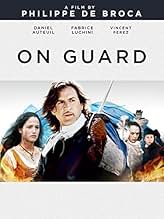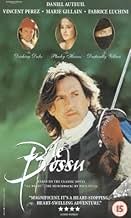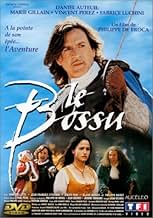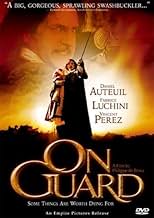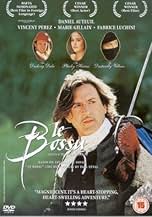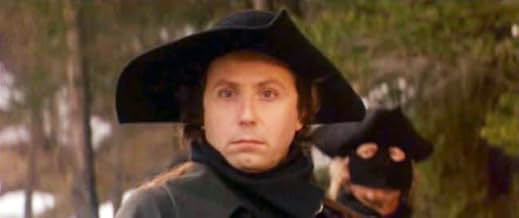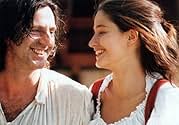NOTE IMDb
6,9/10
4 k
MA NOTE
Le comte de Gonzague manigance contre son cousin, le duc de Nevers, alors même qu'il est l'héritier du duc et héritera de ses biens.Le comte de Gonzague manigance contre son cousin, le duc de Nevers, alors même qu'il est l'héritier du duc et héritera de ses biens.Le comte de Gonzague manigance contre son cousin, le duc de Nevers, alors même qu'il est l'héritier du duc et héritera de ses biens.
- Réalisation
- Scénario
- Casting principal
- Nomination aux 1 BAFTA Award
- 2 victoires et 9 nominations au total
Jacques Sereys
- Caylus
- (as Jacques Sereys de la Comédie Française)
James Thierrée
- Marcello
- (as James Thiérrée)
Avis à la une
Alexandre Dumas made a reputation for himself writing stories chiefly about the uncommon man who had to rise to the occasion in extraordinary circumstances. Arguably, THE THREE MUSKETEERS and THE COUNT OF MONTE CRISTO stand as some of the best literature of the ages, and the film adaptations have created some of the most incredibly swordplay put to the silver screen.
The little heard of and rarely seen ON GUARD ("Le Bossu," 1997, from the French novel by Paul Feval of the same name), by far, features some of the most exciting swordplay with a story that compares to Dumas' best work in many ways.
Daniel Auteuil stars as Lagardere, a budding swordsman who can't back down from a fight. One evening, upon trying to best the Duke of Nevers, he inadvertently falls into the duke's good graces and joins him -- as a sidekick -- on a journey to rescue the man's infant daughter, Aurore. However, as the duke is soon murdered by his villainous cousin Count Gonzague (played with ample creepiness by Fabrice Luchini), Lagardere escapes with the infant and, along with the help of a traveling circus, raises her as his own child for sixteen years ... until Aurore takes up the sword and performs a move only her real father could've known, alerting the now-in-power Gonzague to the fact the the daughter has survived. Now, Legardere is faced with the ultimate challenge of devising a masterful plot to put the woman back on the throne and into her position of prominence!
Much of the film is pure plotting and humor, some of which can only be the product of the French ("Ever try sodomy, my friend?"), and I'm quite certain several of the jokes might be lost on an American audience. Still, Auteuil as Lagardere is the film's masterful stroke; he proves himself capable of a Musketeer-like defender, a loving father, and a pining lost soulmate to the lovely Aurore, all the while maintaining his sense of duty coupled with a great sense of humor.
The film is presented widescreen, filmed on beautiful locations, and the sound is very crisp and vibrant. ON GUARD is a wonderful adaptation that deserves to be discovered by a much larger audience.
The little heard of and rarely seen ON GUARD ("Le Bossu," 1997, from the French novel by Paul Feval of the same name), by far, features some of the most exciting swordplay with a story that compares to Dumas' best work in many ways.
Daniel Auteuil stars as Lagardere, a budding swordsman who can't back down from a fight. One evening, upon trying to best the Duke of Nevers, he inadvertently falls into the duke's good graces and joins him -- as a sidekick -- on a journey to rescue the man's infant daughter, Aurore. However, as the duke is soon murdered by his villainous cousin Count Gonzague (played with ample creepiness by Fabrice Luchini), Lagardere escapes with the infant and, along with the help of a traveling circus, raises her as his own child for sixteen years ... until Aurore takes up the sword and performs a move only her real father could've known, alerting the now-in-power Gonzague to the fact the the daughter has survived. Now, Legardere is faced with the ultimate challenge of devising a masterful plot to put the woman back on the throne and into her position of prominence!
Much of the film is pure plotting and humor, some of which can only be the product of the French ("Ever try sodomy, my friend?"), and I'm quite certain several of the jokes might be lost on an American audience. Still, Auteuil as Lagardere is the film's masterful stroke; he proves himself capable of a Musketeer-like defender, a loving father, and a pining lost soulmate to the lovely Aurore, all the while maintaining his sense of duty coupled with a great sense of humor.
The film is presented widescreen, filmed on beautiful locations, and the sound is very crisp and vibrant. ON GUARD is a wonderful adaptation that deserves to be discovered by a much larger audience.
Among the various adaptations of Paul Feval's novel the modernity of that one lies in the fight scenes.
On the other hand the 1959 version starring Jean Marais was less dark. The murder of Nevers was not emphasized whereas the part is much important with Vincent Perez's great performance. Fabrice Luchini and Daniel Auteuil also give the best to their characters, but the result is less flamboyant as they are more humane.
This can be seen as the result of the Nouvelle Vague fight against the 1950s French popular cinema.
On the other hand the 1959 version starring Jean Marais was less dark. The murder of Nevers was not emphasized whereas the part is much important with Vincent Perez's great performance. Fabrice Luchini and Daniel Auteuil also give the best to their characters, but the result is less flamboyant as they are more humane.
This can be seen as the result of the Nouvelle Vague fight against the 1950s French popular cinema.
10Deusvolt
I first mistook Daniel Auteuil for Gerard Depardieu. The French, it seems, have a predilection for unhandsome actors the likes of Yves Montand and Jean Paul Belmondo. But I am not complaining. I like them because they are so credible.
I highly recommend this movie if you liked Scaramouche, Cyrano de Bergerac, The Three Musketeers and other movies featuring dazzling rapier swordplay. The wonderful scenery, excellent choice of locations, intricate props and background really brings you back to France in the 1700s.
A nice American connection is made when the villain Gonzague is shown to be selling shareholdings in a land venture in Mississippi which at the time was still in French hands.
The armsmasters, fencing instructors and stuntmen did a wonderful job. The "Nevers attack," however, is dubious. A trained fencer can easily foil it.
Did you feel like giving the Duke of Nevers a scuff on the head for being so careless with his wealth and his life? But there are real people like that.
At times, the plot and dialog become maudlin perhaps as a sop to the ladies who would have to watch the movie with swordplay enthusiasts.
I highly recommend this movie if you liked Scaramouche, Cyrano de Bergerac, The Three Musketeers and other movies featuring dazzling rapier swordplay. The wonderful scenery, excellent choice of locations, intricate props and background really brings you back to France in the 1700s.
A nice American connection is made when the villain Gonzague is shown to be selling shareholdings in a land venture in Mississippi which at the time was still in French hands.
The armsmasters, fencing instructors and stuntmen did a wonderful job. The "Nevers attack," however, is dubious. A trained fencer can easily foil it.
Did you feel like giving the Duke of Nevers a scuff on the head for being so careless with his wealth and his life? But there are real people like that.
At times, the plot and dialog become maudlin perhaps as a sop to the ladies who would have to watch the movie with swordplay enthusiasts.
Not a deep film in any sense but a magnificently entertaining one nevertheless. Witty and fast-paced, it bears comparison with the highly popular 'Taxi' films. Probably my favourite French film in terms of the sheer pleasure it has given me.
Set in the France of Louis XIV and the Regency which followed his death c.1699 - c.1720, it contains a fair degree of historical accuracy. Philippe d'Orleans, Regent of France (Philippe Noiret) has a central role as the arbiter of justice who ultimately allows good to triumph over evil. This is an unabashedly romantic view of absolutist France and one should not delve too deeply into the world that is recreated here. Like Robin Hood movies, the historical backcloth provides the setting for a good swashbuckle with an underdog hero eventually triumphing over a high-born villain against all the odds.
The later plot revolves around the Louisiana scheme which saw fortunes won and lost in an early example of stock market speculation - a French equivalent of the British South Sea Bubble.
It is also a buddy movie with the main hero (Daniel Auteuil) striking up a friendship across the class barrier with the Duc de Nevers who reveals the secret Nevers sword thrust, a leitmotif which starts and ends the film and helps the (19-year?) time span hang together.
Never's scheming cousin murders him in order to inherit his fortune and the film quickly turns into a revenge movie. Auteuil saves Nevers' baby girl and heir and plots to topple the villain and to restore her to her rightful place.
Towards the end the film becomes heavily romantic and reviewers have questioned the plausibility of the resulting relationship. It is perhaps the weakest part of the plot.
The catchy score helps the film to bowl along in a relatively light-hearted way. Despite a lot of villainy and murder, the film's main tenor is one of unremitting fun. Were it being acted out on stage it would almost be a farce. Simply wonderful!
Set in the France of Louis XIV and the Regency which followed his death c.1699 - c.1720, it contains a fair degree of historical accuracy. Philippe d'Orleans, Regent of France (Philippe Noiret) has a central role as the arbiter of justice who ultimately allows good to triumph over evil. This is an unabashedly romantic view of absolutist France and one should not delve too deeply into the world that is recreated here. Like Robin Hood movies, the historical backcloth provides the setting for a good swashbuckle with an underdog hero eventually triumphing over a high-born villain against all the odds.
The later plot revolves around the Louisiana scheme which saw fortunes won and lost in an early example of stock market speculation - a French equivalent of the British South Sea Bubble.
It is also a buddy movie with the main hero (Daniel Auteuil) striking up a friendship across the class barrier with the Duc de Nevers who reveals the secret Nevers sword thrust, a leitmotif which starts and ends the film and helps the (19-year?) time span hang together.
Never's scheming cousin murders him in order to inherit his fortune and the film quickly turns into a revenge movie. Auteuil saves Nevers' baby girl and heir and plots to topple the villain and to restore her to her rightful place.
Towards the end the film becomes heavily romantic and reviewers have questioned the plausibility of the resulting relationship. It is perhaps the weakest part of the plot.
The catchy score helps the film to bowl along in a relatively light-hearted way. Despite a lot of villainy and murder, the film's main tenor is one of unremitting fun. Were it being acted out on stage it would almost be a farce. Simply wonderful!
De Broca, who had made the marvelous swashbuckler CARTOUCHE (1962), returns to the genre after 35 years with this unexpectedly old-fashioned and highly entertaining romp.
Daniel Auteil is the unlikely hero, who is also called on to show his versatility as an actor by dressing up as the titular character. He's supported by a good cast: Vincent Perez as a womanizing aristocrat, Fabrice Luchini as a somewhat reticent villain and Philippe Noiret as a Regent; lovely Marie Gillain is Auteil's improbable love interest (she was raised by him after being saved from death's clutches).
The film's theatrical milieu brings forth obvious comparisons with SCARAMOUCHE (1952) but the sumptuous décor, Philippe Sarde's rousing score and a plot-packed narrative keep one watching. In fact, it was so well-received at the time of its release as to be nominated for several international film awards!
De Broca is a distinguished French film-maker but, unfortunately, very little of his early work is available for reassessment; I've only watched 5 myself (including this one) and all proved to be well worth watching.
Daniel Auteil is the unlikely hero, who is also called on to show his versatility as an actor by dressing up as the titular character. He's supported by a good cast: Vincent Perez as a womanizing aristocrat, Fabrice Luchini as a somewhat reticent villain and Philippe Noiret as a Regent; lovely Marie Gillain is Auteil's improbable love interest (she was raised by him after being saved from death's clutches).
The film's theatrical milieu brings forth obvious comparisons with SCARAMOUCHE (1952) but the sumptuous décor, Philippe Sarde's rousing score and a plot-packed narrative keep one watching. In fact, it was so well-received at the time of its release as to be nominated for several international film awards!
De Broca is a distinguished French film-maker but, unfortunately, very little of his early work is available for reassessment; I've only watched 5 myself (including this one) and all proved to be well worth watching.
Le saviez-vous
- AnecdotesThe original piece writing was made in 1857. The movie was produced 140 years laters that its original writing. The same time between the related history and the writing.
- GaffesWhen the Duc dubs Lagardère, the sword he draws and uses is a fencing foil, complete with guarded tip, rather than the rapier he uses in a later scene.
Meilleurs choix
Connectez-vous pour évaluer et suivre la liste de favoris afin de recevoir des recommandations personnalisées
- How long is On Guard?Alimenté par Alexa
Détails
- Date de sortie
- Pays d’origine
- Langues
- Aussi connu sous le nom de
- On Guard
- Lieux de tournage
- Fort Queyras, Hautes-Alpes, France(Caylus castle)
- Sociétés de production
- Voir plus de crédits d'entreprise sur IMDbPro
Box-office
- Budget
- 30 000 000 $US (estimé)
- Durée
- 2h 8min(128 min)
- Couleur
- Mixage
- Rapport de forme
- 2.35 : 1
Contribuer à cette page
Suggérer une modification ou ajouter du contenu manquant

![Regarder Bande-annonce [OV]](https://m.media-amazon.com/images/M/MV5BMjkxN2FiNzgtYmZkZC00Mjk2LWI2NjAtOGQ5NDhmNWI4OGIzXkEyXkFqcGdeQXRyYW5zY29kZS13b3JrZmxvdw@@._V1_QL75_UX500_CR0)
